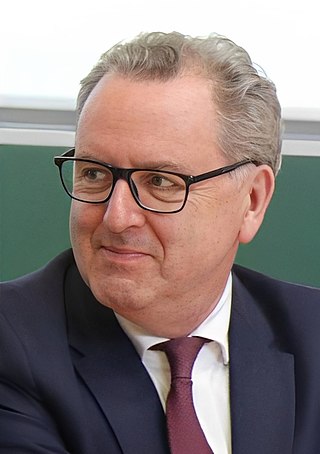Liberalism and radicalism have played a role in the political history of France. The main line of conflict in France in the long nineteenth century was between monarchists and republicans. The Orléanists, who favoured constitutional monarchy and economic liberalism, were opposed to the Republican Radicals.
The Democratic Movement is a centre to centre-right political party in France, whose main ideological trends are liberalism and Christian democracy, and that is characterised by a strong pro-Europeanist stance. MoDem was established by François Bayrou to succeed the Union for French Democracy (UDF) and contest the 2007 legislative election, after his strong showing in the 2007 presidential election. Initially named the Democratic Party, the party was renamed "Democratic Movement", because there was already a small Democratic Party in France.
In parliamentary politics, balance of power is a situation in which one or more members of a parliamentary or similar chamber can by their uncommitted vote enable a party to attain and remain in minority government. The term may also be applied to the members who hold that position. The members holding the balance of power may guarantee their support for a government by either joining it in a coalition government or by an assurance that they will vote against any motion of no confidence in the government or will abstain in such a vote. In return for such a commitment, such members may demand legislative or policy commitments from the party they are to support. A person or party may also hold a balance of power in a chamber without any commitment to government, in which case both the government and opposition groupings may on occasion need to negotiate for that person's or party's support.

The Socialist Party is a centre-left to left-wing political party in France. It holds social democratic and pro-European views. The PS was for decades the largest party of the "French Left" and used to be one of the two major political parties in the French Fifth Republic, along with the Union for a Popular Movement. It replaced the earlier French Section of the Workers' International in 1969 and is currently led by First Secretary Olivier Faure. The PS is a member of the Party of European Socialists, Progressive Alliance and Socialist International.

The 2nd constituency of Haute-Saône is a French legislative constituency in the Haute-Saône département. Like the other 576 French constituencies, it elects one MP using a two round electoral system.

Legislative elections were held in France on 11 and 18 June 2017 to elect the 577 members of the 15th National Assembly of the Fifth Republic. They followed the two-round presidential election won by Emmanuel Macron. The centrist party he founded in 2016, La République En Marche! (LREM), led an alliance with the centrist Democratic Movement (MoDem); together, the two parties won 350 of the 577 seats—a substantial majority—in the National Assembly, including an outright majority of 308 seats for LREM. The Socialist Party (PS) was reduced to 30 seats and the Republicans (LR) reduced to 112 seats, and both parties' allies also suffered from a marked drop in support; these were the lowest-ever scores for the centre-left and centre-right in the legislative elections. The movement founded by Jean-Luc Mélenchon, la France Insoumise (FI), secured 17 seats, enough for a group in the National Assembly. Among other major parties, the French Communist Party (PCF) secured ten and the National Front (FN) obtained eight seats. Both rounds of the legislative election were marked by record low turnout.

Renaissance (RE) is a liberal and centrist political party in France. The party was originally known as En Marche ! and later La République En Marche !, before adopting its current name in September 2022. RE is the leading force of the centrist Together coalition, coalesced around Emmanuel Macron's original presidential majority.

Richard Ferrand is a French politician of La République En Marche! (LREM) who served as President of the National Assembly from 2018 to 2022. He had served as a member of the National Assembly for Finistère's 6th constituency from 2012 to 2022. A longtime member of the Socialist Party, he was LREM's General Secretary from October 2016. He briefly served as Minister for the Cohesion of Territories between May and June 2017 before resigning due to nepotism accusations. Following his resignation, he became the leader of the party's group in the National Assembly in June 2017 and then was elected to the Chamber's Presidency in September 2018.

Presidential elections were held in France on 10 and 24 April 2022. As no candidate won a majority in the first round, a runoff was held, in which Emmanuel Macron defeated Marine Le Pen and was re-elected as President of France. Macron, from La République En Marche! (LREM), had defeated Le Pen, leader of the National Rally, once already in the 2017 French presidential election, for the term which expired on 13 May 2022. Macron became the first president of France to win a re-election bid since Jacques Chirac won in 2002.

The 15th legislature of the French Fifth Republic was the French Parliament that was in office from 27 June 2017 until 21 June 2022. The party of President Emmanuel Macron, La République En Marche! (LREM), obtained an absolute majority of 308 deputies, alongside its ally, the Democratic Movement (MoDem), which secured 42 seats. The newly-installed deputies elected François de Rugy as President of the National Assembly when the National Assembly first convened on 27 June. The legislative election saw a record level of renewal, with only a quarter of the deputies elected in 2012 also elected in 2017, as well as a significant increase in the representation of women and youth. With seven planned parliamentary groups, it would be the most fragmented National Assembly since 1958.

The 2020 Paris Municipal election was a municipal election that took place in Paris on 15 March 2020, alongside other French municipal elections. The second round, which was originally scheduled to be held on 22 March 2020, was postponed due to the COVID-19 pandemic in France. The second round then took place on 28 June 2020, which saw Anne Hidalgo re-elected as Mayor of Paris.

Senatorial elections were held on 27 September 2020 to renew 172 of the 348 seats in the Senate of the French Fifth Republic. The elections were a modest victory for the centre-right Republicans. The environmentalist Europe Ecology – The Greens party entered the upper chamber, while Emmanuel Macron's centrist La République En Marche! party maintained their position, despite losses in the 2020 French municipal elections earlier in the year. The far-right National Rally kept their one seat, and the Corsican nationalists gained their first seat as well.

Legislative elections were held in France on 12 and 19 June 2022 to elect the 577 members of the 16th National Assembly of the Fifth Republic. The elections took place following the 2022 French presidential election, which was held in April 2022. They have been described as the most indecisive legislative elections since the establishment of the five-year presidential term in 2000 and subsequent change of the electoral calendar in 2002. The governing Ensemble coalition remained the largest bloc in the National Assembly but substantially lost its ruling majority, resulting in the formation of France's first minority government since 1993; for the first time since 1997, the incumbent president of France did not have an absolute majority in Parliament. As no alliance won a majority, it resulted in a hung parliament for the first time since 1988.
Ensemble is a liberal political coalition in France created by Emmanuel Macron. Formed in November 2021 as Ensemble Citoyens, it makes up the presidential majority and includes Renaissance, Democratic Movement (MoDem), Horizons, En commun, and the Progressive Federation. The coalition included the parties Agir and Territories of Progress (TDP) until they were merged into the rebranded Renaissance. Ensemble has mainly been described as being centrist, and sometimes as centre-left or centre-right on the political spectrum.

The New Ecological and Social People's Union was a left-wing electoral alliance of political parties in France. Formed on May Day 2022, the alliance included La France Insoumise (LFI), the Socialist Party (PS), the French Communist Party (PCF), The Ecologists (LE), Ensemble! (E!), and Génération.s (G.s), and their respective smaller partners. It was the first wide left-wing political alliance since the Plural Left in the 1997 French legislative election. Over 70 dissident candidates who refused the accord still ran.

Centrism in France has played a major role in French politics over many decades. This page presents the parties, political movements and personalities linked to Centrism in France according to their political traditions or their background. The different families of centrism are presented in the different sections.

A legislative election was held in France on 30 June 2024, with a second round held on 7 July, to elect all 577 members of the 17th National Assembly of the Fifth French Republic. The election followed the dissolution of the National Assembly by President Emmanuel Macron, who decided to call a snap election in the aftermath of the 2024 European Parliament election in France in which the National Rally made substantial gains against his Besoin d’Europe electoral list. The latter lost a considerable number of seats compared to the 2019 European Parliament election.

The New Popular Front is a broad left-wing electoral alliance in France launched on 10 June 2024 to contest the 2024 legislative election. The Front brings together La France Insoumise, the Socialist Party, the Ecologists, the French Communist Party, Génération.s, Place Publique, and other centre-left and left-wing political parties, while pushing for a mobilisation of associations, organised labour, and civil society. With the unifying motive of defeating the far-right National Rally, its name echoes the interwar anti-fascist alliance the Popular Front.
Andréa Kotarac is a French politician. He has served as a councilor from the National Rally (RN) list in the Auvergne-Rhône-Alpes regional council since July 2021. He was previously a member of the regional council for the Left Party (PG)/La France Insoumise (LFI) from January 2016 to September 2019.















